|
|
 |
|
Mormonilloida ( Order ) |
|
|
|
Mormonillidae ( Family ) |
|
|
|
Neomormonilla ( Genus ) |
|
|
| |
Neomormonilla minor (Giesbrecht, 1891) (F,M) | |
| | | | | | | Syn.: | no Mormonilla polaris Sars, 1900 (p.120, figs.F); Mrazek, 1902 (p.524); Harding, 1966 (p.17, 71); Kosobokova, 1989 (p.26); Kosobokova & al., 1995 (p.194);
? Mormonilla atlantica Wolfenden, 1905 a (p.16); Pearson, 1906 (p.31); van Breemen, 1908 a (p.166, Rem.); Farran, 1908 b (p.88, Rem.);
Mormonilla minor : Giesbrecht, 1892 (p.532, 537, 774, figs.F); Farran, 1908 b (p.88, Rem.); 1926 (p.293); Rose, 1933 a (p.279, figs.F); Farran, 1936 a (p.124); Lysholm & al., 1945 (p.44); Marques, 1958 a (p.136, fig.F); Grice, 1963 a (p.496); M.W. Johnson, 1963 (p.89, Table 1, 2); Furuhashi, 1966 a (p.295, vertical distribution in Oyashio/Kuroshio transitional area, Table 7, 8, 9); Owre & Foyo, 1967 (p.103, figs.F); Minoda, 1971 (p.43); Vives, 1972 (p.225, Rem.); Boxshall, 1979 (p.258, figs.F, Rem.); Huys & Boxshall, 1991 (p.174, figs.F); Huys & al., 1992 (p.165, Descr.M, figs.M, Rem.F); Chihara & Murano, 1997 (p.952, Pl.204: F,M); Boxshall & Halsey, 2004 (p.418: F,M);
Ref. compl.: C.B. Wilson, 1950 (p.268); V.N. Greze, 1963 a (tabl.2); Shmeleva, 1963 (p.141); De Decker & Mombeck, 1964 (p.13); Pavlova, 1966 (p.44); Furuhashi, 1966 a (p.295, vertical distribution in Kuroshio region); Delalo, 1968 (p.138); Vinogradov, 1968 (1970) (p.268); Gamulin, 1971 (p.382, tab.3); Deevey, 1971 (p.224); Deevey & Brooks, 1977 (tab.2); Vives, 1982 (p.295); Kovalev & Shmeleva, 1982 (p.85); Scotto di Carlo & Ianora, 1983 (p.150); Greze & al., 1983 (p.17); Scotto di Carlo & al., 1984 (p.1041); Greze & al., 1985 (p.8); Hopkins & Torres, 1988 (tab.1); Lozano Soldevilla & al., 1988 (p.60); Scotto di Carlo & al., 1991 (p.270); Mumm, 1993 (tab.1, fig.2); Böttger-Schnack, 1995 (p.93); 1996 (p.1088); 1997 (p.409); Hure & Krsinic, 1998 (p.75, 103, 112); Padmavati & al., 1998 (p.349); Kosobokova & al., 1998 (tab.2); Lapernat, 1999 (p.31); Kosobokova & Hirche, 2000 (p.2029, tab.2); Lapernat & Razouls, 2001 (tab.1); Holmes, 2001 (p.61); Vukanic, 2003 (p.139, tab.1); Vukanic & Vukanic, 2004 (p.9, tab. 2); Blachowiak-Samolyk & al., 2007 (p.2716, Table 2); Morales-Ramirez & Suarez-Morales, 2008 (p.515, 523); Fernandes, 2008 (p.465, Tabl.2); Raybaud & al., 2008 (p.1765, Table A1); Blachowiak-Samolyk & al., 2008 (p.2210, Table 3, biomass, composition); Licandro & Icardi, 2009 (p.17, Table 4); Kosobokova & Hopcroft, 2010 (p.96, Table 1, fig.7); Vives & Shmeleva, 2010 (p.192, figs.F,M, Rem.); Medellin-Mora & Navas S., 2010 (p.265, Tab. 2); Kosobokova & al., 2011 (p.29, Table 2, fig.7, Rem.: Arctic Basins); Hsiao S.H. & al., 2011 (p.475, Appendix I); Miloslavic & al., 2012 (p.165, Table 2, transect distribution) | | | | Ref.: | | | Ivanenko & Defaye, 2006 (p.718, Redescr. F, figs.F, Rem., p.724, comb. nov.); Fierro & al., 2016 (p.23, figs. F, Rem.) | 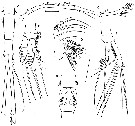 issued from : G.A. Boxshall in Bull. Br. Mus. nat. Hist. (Zool.), 1979, 35 (3). [p.259, Fig.27]. As Mormonilla minor. Female (from 18°N, 25°W): A, urosome (dorsal); B, genital complex (ventral); C, A1; D, Mxp; E, P1; F, P2. Scales 0.1 mm.
|
 issued from : G.A. Boxshall in Bull. Br. Mus. nat. Hist. (Zool.), 1979, 35 (3). [p.258]. Armature formula of swimming legs P1 to P4. Roman numeral : spine; arabic numeral: seta. Nota: Lateral seta on caudal ramus located about 16 % of distance along ramus. A1 4-segmented; relative lengths of segments about 25:28:25:22. Mxp indistinctly 3-segmented.
|
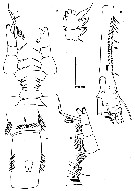 issued from : V.N. Ivanenko & D. Defaye in Crustaceana, 2006, 79 (6). [p.719, Fig.5]. Female (from 18°N, 25°W): A, 1st somite of urosome and genital double-somite (ventral; ventral setae arrowed); B, distal segment of A1 (short spinules arrowed); C, P1:endopods, coxal and basal inner margins (anterior; serrated margin of distomedial seta arrowed); D, P1: distal exopodal segments (anterior; small curved spinules arrowed); E, P1: inner margins of coxa and basis, endopods (posterior; another specimen). Nota: 3rd segment of A1 ornamented with rows of setules and row of short stout spinules, bearing 9 setae. Masticatory blade of gnathobase of Md with 8 serrated teeth ; lateral tooth large and separated from others ; basis armed with 3 inner setae. Mx1 : one of 6 inner setae of protopod elongate. Mxp 4-segmented ; outer margin of 1st segment with few setules1st urosomal somite with rows of setules on ventral and lateral sides. Genital double-somite with lateral setules.
|
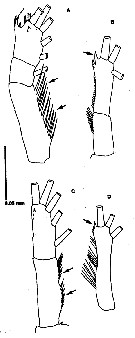 issued from : V.N. Ivanenko & D. Defaye in Crustaceana, 2006, 79 (6). [p.720, Fig.6]. Female: A, exopod of P2 (posterior; ornamentation with spinules: arrowed); B, endopod of P2 (posterior; distolateral spinules arrowed); C, exopod of P3 (posterior; ornamentation with spinules arrowed); D, endopod of P3 (posterior; distolateral spinules arrowed).
|
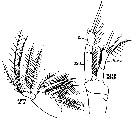 Issued from : W. Giesbrecht in Systematik und Faunistik der Pelagischen Copepoden des Golfes von Neapel und der angrenzenden Meeres-Abschnitte. – Fauna Flora Golf. Neapel, 1892. Atlas von 54 Tafeln. [Taf.43, Figs.27, 33]. As Mormonilla minor. Female: 27, Mxp (posterior view); 33, P2.
|
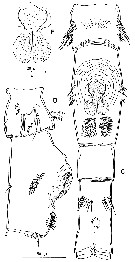 issued from : R.H. Huys & G.A. Boxshall in Copepod Evolution. The Ray Soc., 1991, 159. [p.174, Fig.2.6.2, C-D, E]. As Mormonilla minor. Female (from Cape Verde Islands): C, urosome (caudal rami omitted; ventral view); D, genital double somite and 1st urosome somite (lateral view); E, P6 (closing off genital apertures).
|
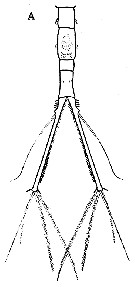 Issued from : P.A. Fierro, P. Hidalgo, P. Pino-Pinuer & M. Marchant in Crustaceana, 2016, 89 (1). [p.22, Fig.3 A]. Female (from N Chile): A, urosome and caudal rami (dirsal).
|
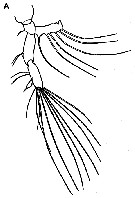 Issued from : P.A. Fierro, P. Hidalgo, P. Pino-Pinuer & M. Marchant in Crustaceana, 2016, 89 (1). [p.24, Fig.5 A]. Female: A2 (left side ?).
|
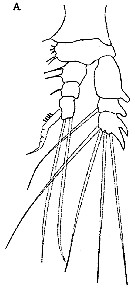 Issued from : P.A. Fierro, P. Hidalgo, P. Pino-Pinuer & M. Marchant in Crustaceana, 2016, 89 (1). [p.25, Fig.6 A]. Female: P1.
|
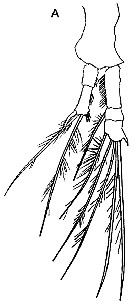 Issued from : P.A. Fierro, P. Hidalgo, P. Pino-Pinuer & M. Marchant in Crustaceana, 2016, 89 (1). [p.26, Fig.7 A]. Female: P2.
| | | | | Compl. Ref.: | | | Mazzocchi & Di Capua, 2010 (p.430); Andersen N.G. & al., 2011 (p.71, Fig.3: abundance); Siokou & al., 2013 (p.1313, fig.4, 8, biomass, vertical distribution); Fierro Gonzalvez, 2014 (p.1, Tab. 3, 5, occurrence, abundance); Smoot & Hopcroft, 2016 (p.1, Rem.: p.7, fig.3, abundance vs water mass); Benedetti & al., 2016 (p.159, Table I, fig.1, functional characters); Benedetti & al., 2018 (p.1, Fig.2: ecological functional group); Hure M. & al., 2018 (p.1, Table 1: abundance, % composition, Table 2: correlations) | | | | NZ: | 15 + 1 doubtful | | |
|
Distribution map of Neomormonilla minor by geographical zones
|
| | | | | | | | | | | | | | | | Loc: | | | Antarct. ( Weddell Sea), South Africa (E), Angola, Cape Verde Is., off Morocco, Canary Is., off Madeira, Ibero-moroccan Bay, off Amazon, Caribbean Sea, Caribbean Colombia, E Costa Rica, Sargasso Sea, off Bermuda: Station ‘’ S’’ (32°10’N, 64°30’W), Bay of Biscay, off W Ireland, Medit. (Alboran Sea, W Basin, Ligurian Sea, Tyrrhenian Sea, off Malta, Adriatic Sea, Ionian Sea, Aegean Sea, Johnston Bank, Bassin Lebanon Basin), Red Sea, Arabian Sea, Madagascar (Nosy Bé), S Indian, Bay of Bengal, Taiwan (E: Kuroshio Current), Pacif. (W equatorial), W Costa Rica, off SW Galapagos, Australia (Great Barrier), Japan, ? Bering Sea, Arct. (Fram Strait, Canadian abyssal plain, Nansen Basin, Amudsen Basin, Makarov Basin, Laptev Sea, Lomonosov Ridge, Canada Basin, Beaufort Sea). | | | | N: | 68 ? | | | | Lg.: | | | (34) F: 1,12-1,08; (38) F: 0,84-0,81; (46) F: 1,35-1,25; (134) F: 1,38; (138) F: 1,38-1,2; (208) F: 1,34-1,26; (340) F: 1,2; (618) F: 1,31-1,04; (619) M: 0,84-0,75; (1203) F: 1,125-1,500; {F: 0,81-1,50; M: 0,75-0,84} | | | | Rem.: | Meso-bathypelagic. Overall Depth Range in Sargasso Sea: 0-2000 m (Deevey & Brooks, 1977, Station "S"). 446-719 m at Station S 2 in S Bösö (E middle Japan). 234-3010 m at Station T-1 (E Tori Is., E middle Japan) from Furuhashi (1966 a).
The geographical distribution of this species needs confirmations, notably in the Arctic seas where it could be confused with N. polaris.
For Boxshall (1979, p.258) the segmentation of P1 is rather variable with endopod being either 2-segmented (Giesbrecht, 1891, 1892) or 3-segmented (Sars, 1900; Wolfenden, 1905); this variation appears to reflect merely the degree of separation of the two distal segments and is not regarded as significant (Farran, 1905).
Ivanenko & Defaye (2006, p.722) indicate the type species was originally described as Mormonilla minor Giesbrecht (1891, 1892) from the tropical part of the Pacific Ocean, and the redescription was based on specimens from the northeastern Atlantic (Boxshall, 1979; Huys & Boxshall, 1991). Farran (1908) synonymized Mormonilla atlantica Wolfenden (1905), lacking illustrations, with Mormonilla minor. Further re-examination of mormonillids from the type locality (3°S, 99°W) and comparison with mormonillids from the northeastern Atlantic are necessary to confirm the identity of copepods from the two oceans.
Fierro & al. (2016) note the first record of this species off north Chilean coast, found > 100 m depth associated with oxygen minimum zones and temperatures below 10*C. Any discordance with the morphological description of N. minor by Ivanenko & Defaye (2006), would indicate that further investigation into the variability of the species is required.
After Benedetti & al. (2018, p.1, Fig.2) this species belonging to the functional group 7 corresponding to small filter feeding herbivorous. | | | Last update : 07/12/2020 | |
|
|
 Any use of this site for a publication will be mentioned with the following reference : Any use of this site for a publication will be mentioned with the following reference :
Razouls C., Desreumaux N., Kouwenberg J. and de Bovée F., 2005-2026. - Biodiversity of Marine Planktonic Copepods (morphology, geographical distribution and biological data). Sorbonne University, CNRS. Available at http://copepodes.obs-banyuls.fr/en [Accessed January 20, 2026] © copyright 2005-2026 Sorbonne University, CNRS
|
|
 |
 |












